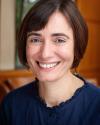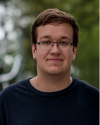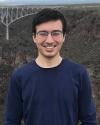Julia Tai leads the Seattle Modern Orchestra and members of the UW Modern Music Ensemble (Cristina Valdés, director) in a program featuring the West Coast premiere of Clocks for Seeing by guest composer Anthony Cheung and world premieres by UW graduate students Justin Zeitlinger, Joe Krycia, Melissa Wang, and Yonatan Ron. With guest faculty Carrie Shaw, soprano.
Program
artifact: Elegy for ensemble* (2024): Justin Zeitlinger (b. 2000)
simulacrum I, for five instruments
simulacrum II, for ten instruments
simulacrum III, for fifteen instruments
Times sway. Echoes, decay… for seven instruments* (2024): Yonatan Ron (b. 1992)
I. Times sway
II. Echoes, decay…
Red Blood Spills and Pools the Same* (2024): Melissa Wang; Text by Wayne Allen Jones (b. 1999)
Carrie Shaw, soprano
- Intermission -
Clocks for Seeing for six musicians** (2023): Anthony Cheung (b. 1982)
I.
II.
III.
IV.
Untiteld for ensemble* (2024): Joe Krycia (b. 1993)
“Clocks for Seeing” was commissioned by the Talea Ensemble, and funded by the Chamber Music America Classical Commissioning Program, with generous funding provided by The Mellon Foundation.
*World premiere
**West Coast premiere
Personnel
Seattle Modern Orchestra
Clarinet/Bass Clarinet: Angelique Poteat
Oboe: Dan Williams
Alto Saxophone: Soren Hamm
Trumpet: Alexander White
Violin I: Luke Fitzpatrick
Viola: Rose Hashimoto
Cello: Ha-Yang Kim
Piano: Cristina Valdés
UW Modern Music Ensemble
Flute/Piccolo/Bass Flute: Rachel Reyes
Flute/Alto Flute: Katelyn Campbell
Bassoon: Ryan Kaspandy
Trombone: Nate Wyttenbach
Tuba: Cole Henslee
French Horn: Nicole Bogner
Violin II: Justin Zeitlinger
Viola: Abigail Schidler
Bass: Eddie Nikishina
Electric Guitar: Nick Mendonsa
Piano: Ella Kalinichenko
Piano/Keyboard: Alex Fang
Percussion: Rose Martin, Melissa Wang
Program Notes
Justin Zeitlinger: artifact: Elegy for ensemble
One of the earliest full-length pieces I ever wrote is Fantasy for String Quintet (2014); the second movement is titled “Elegia.” (I cannot recall what compelled me to write an elegy at thirteen years old!) artifact: Elegy is an attempt to reflect on this work of my past and to examine the nature of the elegy, which here serves to mourn not bodily death but the constant smaller dissolutions of identity intrinsic to lived experience.
To begin, a live audio recording of “Elegia” was taken into Audacity, then tempo-compressed and re-expanded to its original length three separate times in increasing degrees of compression. To perform this operation, Audacity uses a high-quality tempo change algorithm called sub-band sinusoidal modeling synthesis (SBSMS). In short, SBSMS performs a short-time Fourier transform (STFT) of the input sound in fixed chunks, or windows, and reconstructs its frequencies using oscillators over the new target length. The nature of the windowing inherently constrains the frequency and time resolution with each successive compression and re-expansion of the file, which not only corrupts the accuracy of the its spectral content but also adds unintended presences in the sound, called artifacts. The “artifact” in the title thus serves a double meaning, referring also to “Elegia” as a distant relic of my personal past.
The final layer of reconstruction was the transcription of these renderings for an ensemble of acoustic instruments. With the help of the Orchidea package for Max, I drafted orchestrations of the new sound files. Further algorithmic processing of each instrument’s onsets, durations, and dynamics was done in bach to mimic the particular expressive qualities of the files, while preserving the metrical and structural framework of the original. The three pieces that comprise artifact: Elegy call upon the performers to artificially patch together the disparate sonic content as one organism—by necessity, they grow in ensemble size as well as rhythmic and microtonal complexity. In the third piece, the full string quintet of “Elegia” is restored along with ten other instruments.
I have taken to labeling the written pieces as “simulacra,” drawing upon the concept of the hyperreal developed by French philosopher Jean Baudrillard (1929–2007). In presenting three copies with no original, the line between identifiable reality and representation is subjected to a poignant process of blurring and ultimate collapse.
Yonatan Ron: Times sway. Echoes, decay… for seven instruments
The piece explores different types of oscillations, these may present themselves in the form of a simple, repeated melodic interval at a regular rate, or complex, acoustic beats that occur when an interval smaller than a semi-tone is sustained. This notion of stable & regular ratios is also used to serve the majority of rhythmic & metric detail in the piece.
The first movement is based on cascading, scalic patterns that transform into slow melodic-steps and vice versa. While the texture is mostly polyphonic, many phrases and strata intersect with heterophony as well as homophony due to the voices’ proximity in range, or similarity in timbre and rhythm. This movement starts and develops with dense contrapuntal textures and concludes with sparsely voiced chords.
The second movement resonates with the concepts of the first and serves as an echo of the materials explored in it. Differently than the first movement, apart from the imitations at its beginning, in this movement - the degree of autonomy among voices is high, given that voices differ from each other in either rhythm, timbre, or range.
Both movements develop in an interrupted continuous way. There are barely any sudden changes, raptures, nor rests, so that when they occur, their dramatic impact seems substantial.
Melissa Wang: Red Blood Spills and Pools the Same
Red Blood Spills and Pools the Same was inspired by Wayne Allen Jones's poem "jua huwaka ngozi nyeupe" (white skin peels when burned). This work highlights combinations of short percussive sounds such as flute tongue pizzicatos, voiced "ss ss", scraping fingernails on drum heads, drum sticks sliding across the piano keys, and muted piano strings.
jua huwaka ngozi nyeupe (white skin peels when burned)
damu yote ni sawa (red blood spills and pools the same)
roho ziko wazi kama miungu (souls are clear like gods)
– Wayne Allen Jones
Anthony Cheung: Clocks for Seeing for six musicians (2023)
“For me the noise of Time is not sad: I love bells, clocks, watches – and I recall that at first photographic implements were related to techniques of cabinetmaking and the machinery of precision: cameras, in short, were clocks for seeing, and perhaps in me someone very old still hears in the photographic mechanism the living sound of the wood.”
Roland Barthes, Camera Lucida
Joe Krycia: Untiteld for ensemble
Looking back on my compositional output now that I am at the end of my Doctoral studies, I've noticed how many different stylistic shifts I have gone through, including how quick I've been to abandon a style to explore something new. I no longer feel the need to isolate these stylistic interests, and instead want to synthesize all of my interests in every piece I compose going forward. In Untiteld, you will hear tonality, noise, technical complexity, drone, repetition and free improv, often all at once.
Biographies
Julia Tai
Praised by the Seattle Times as “poised yet passionate,” Julia Tai is one of today’s most dynamic conductors on the international stage. She has conducted orchestras all over the world. Currently, she is the Music Director of Missoula Symphony Orchestra & Chorale, and the Co-Artistic Director of the Seattle Modern Orchestra. Recognized as a prominent innovator of the contemporary music world, she has worked with legendary composers, performers, and ensembles such as Jonathan Harvey, Tristan Murail, Robert Aitken, Séverine Ballon, Claire Chase, Stephen Drury, Graeme Jennings, Garth Knox, Carol Robinson, Steven Schick, International Contemporary Ensemble and Ensemble Modern. Under her direction, Seattle Modern Orchestra is a grant recipient of NewMusicUSA, The Amphion Foundation, The Aaron Copland Fund for Music, Washington State Arts Commission, 4Culture, and Seattle Office of Arts and Culture.
Seattle Modern Orchestra
Founded in 2010, Seattle Modern Orchestra (SMO) is the only large ensemble in the Pacific Northwest solely dedicated to the music of the 20th and 21st centuries. Led by co-artistic directors Julia Tai and Jérémy Jolley, SMO commissions and premieres new works from an international lineup of composers, in addition to presenting important pieces from the contemporary repertoire that are rarely if ever heard by Seattle audiences. The ensemble “operates at that exciting cusp between old and new, between tradition and innovation” (Vanguard Seattle) curating new sounds and experiences for concert goers in the region.
SMO provides audiences with performances of the best in contemporary chamber and orchestral music, and develops radio talks, lectures, and other forms of outreach in an accessible and inviting format all designed to expand the listener’s appreciation and awareness of the music of today.
Anthony Cheung
Composer and pianist Anthony Cheung writes music that explores the senses, a wide palette of instrumental play and affect, improvisational traditions, reimagined musical artifacts, and multiple layers of textual meaning. Described as “gritty, inventive and wonderfully assured” (San Francisco Chronicle) and praised for its “instrumental sensuality” (Chicago Tribune), his music reveals an interest in the ambiguity of sound sources and constantly shifting transformations of tuning and timbre. As critic Paul Griffiths writes, “Anthony Cheung has an intensely accurate sense of where his notes are going, and how and why…[his music’s] precision is responsible for a wealth of sonic magic.”
Modern Music Ensemble
Performing repertoire spanning from the 20th century to works by living composers, the Modern Music Ensemble presents three academic year concerts focused on diverse and innovative programming. Under the directorship of Cristina Valdés since 2016, the ensemble has given numerous premieres and performed the works of both established and younger composers such as Patricia Alessandrini, Katie Balch, Olga Neuwirth, Chaya Czernowin, Anna Thorvaldsdóttir, Beat Furer, Kaija Saariaho, George Lewis, Wang Lu, José-Luis Hurtado, Pierre Boulez, Oliver Schneller, Carlos Sanchez-Gutierrez and Ania Vu, amongst many others. The ensemble works regularly with visiting composers, conductors, and coaches/performers. Guests have included Stephen Drury, Garth Knox, Ursula Oppens, and Ludovic Morlot.
Carrie Shaw
Praised in the New York Times “as graceful vocally as she was in her movements”, “consistently stylish” (Boston Globe), and as a “cool, precise soprano” (Chicago Tribune), Carrie Henneman Shaw is a two-time McKnight Fellowship for Performing Musicians winner (2010, 2017). She has premiered major works by such Minnesota composers as Jocelyn Hagen and Abbie Betinis, whose annual Christmas carols she records for Minnesota Public Radio, and sung American premieres by such composers as Georg Friedrich Haas, Hans Thomalla, and Augusta Read Thomas. In addition to her work as an interpreter of contemporary works, Carrie specializes in music of the 17th century and has performed operatic roles with one of America’s leading Baroque opera companies, Boston Early Music Festival. Carrie is a member of Chicago’s Ensemble Dal Niente, Quince Ensemble, and uluuul. She holds degrees in English and voice performance from Lawrence University and a doctorate from the University of Minnesota.

Recently hailed by Fanfare Magazine as “excellent” and “clearly sensitive,” Cuban-American pianist Cristina Valdés is known for presenting innovative concerts with repertoire spanning over 300 years. A fierce advocate for new music, she has premiered countless works, including many written for her. She has performed across four continents and in venues such as Lincoln Center, Benaroya Hall, Carnegie Recital Hall, Le Poisson Rouge, Roulette, Miller Theatre, Jordan Hall, and the Kennedy Center. Ms. Valdés has appeared both as a soloist and chamber musician at festivals worldwide including New Music in Miami, the Foro Internacional de Música Nueva in Mexico City, Brisbane Arts Festival, the Festival of Contemporary Music in El Salvador, Havana Contemporary Music Festival, and the Singapore Arts Festival.
An avid chamber musician and collaborator, Ms. Valdés has toured extensively with the Bang On a Can “All Stars”, and has performed with the Seattle Chamber Players, the Mabou Mines Theater Company, the Parsons Dance Company, and Antares. Her performances on both the Seattle Symphony’s Chamber Series and [UNTITLED] concerts have garnered critical acclaim, including her “knockout” (Seattle Times) performance of Bartok’s Sonata for Two Pianos and Percussion, and her “arrestingly eloquent performance” of Dutilleux’s Trois Preludes (Bernard Jacobson/MusicWeb International).
Ms. Valdés has appeared as concerto soloist with the Seattle Symphony, Seattle Philharmonic, the Lake Union Civic Orchestra, Johns Hopkins Symphony Orchestra, the Binghamton Philharmonic, NOCCO, Philharmonia Northwest, the Eastman BroadBand, and the Stony Brook Symphony Orchestra, amongst others. In 2015 she performed the piano solo part of the Ives 4th Symphony with the Seattle Symphony under the direction of Ludovic Morlot, which was later released on CD to critical acclaim and made Gramophone’s list of Top 10 Ives Recordings. Other recent recordings include Orlando Garcia’s From Darkness to Luminosity with the Málaga Philharmonic on the Toccata Classics label, and the world premiere recording of Kotoka Suzuki’s Shimmer, Tree | In Memoriam Jonathan Harvey. She can also be heard on the Albany, Newport Classics, Urtext, and Ideologic Organ labels.
In recent seasons she gave performances of Beethoven’s Piano Concerto No. 3, Bartok’s Piano Concerto No. 3, the world-premiere performance of Carlos Sanchez-Guttierez’s Short Stories for piano and string orchestra with the Orquesta de Cámara de Bellas Artes in Mexico City, and the US Premiere of Under Construction for solo piano and tape playback by Heiner Goebbels at Benaroya Hall. Last season included a wide variety of performances including Gershwin’s Rhapsody in Blue, the premiere of her own composition Sketches of an Anniversary Prelude for trumpet and piano, and the premiere of composer Jeremy Jolley’s (contro-)clessidra IV for piano and electronics written especially for her.
Since 2006 she has made her home in Seattle where she has been an integral part of the new music scene. Ms. Valdés founded the SLAM Festival, a new music festival dedicated to the music of Latin-American composers, and is a core member of the Seattle Modern Orchestra - the only large chamber orchestra in the Pacific Northwest solely dedicated to the music of the 20th and 21st centuries. With the Seattle Modern Orchestra, she has premiered works by Anahita Abbasi, Darius Jones, Wang Lu, Kaley Eaton, Jeremy Jolley, and Yigit Kolat, amongst others.
Ms. Valdés received a Bachelor of Music from the New England Conservatory of Music, and a Master of Music and Doctor of Musical Arts from SUNY Stony Brook. While at Stony Brook, she was a recipient of the Thayer Minority Fellowship, a member of the Stony Brook Graduate Piano Trio, and a winner of the Concerto Competition. She is currently an artist-in-residence at the University of Washington, where she teaches piano and is the director of the UW Modern Music Ensemble.

Joe Krycia (He/Him, b.1993) is currently a DMA student in composition at UW Seattle. He holds a M.M from the Manhattan School of Music and a B.M. from Michigan State University. He has also studied at summer programs including Darmstadt and New Music On the Point. His music has been performed by ensembles such as The President's Own United States Marine Band, Sputterbox, and ~Nois Saxophone Quartet.

B.A in Composition – Royal Conservatory of The Hague, Holland (2021)
M.M in Composition – University of Washington (2024)
DMA in Composition – University of Washington (Expected 2027)
Yonatan Ron began his musical journey as a non-classically trained guitarist. He later studied music theory and classical guitar independently under composer and guitarist Ruben Seroussi, head of the composition department and Guitar performance department at Tel-Aviv University.
During the 2015 and 2016 concert seasons, Yonatan composed for Meitar Ensemble’s 'Tedarim Program' — and occasionally participated in the ‘CEME’ festival held by Meitar Ensemble, with master classes given by G.F Haas, Ivan Fedele, and Philippe Leroux, among others.
In his music, seemingly ordinary materials develop through gradational transformations, often to the point of unrecognizability. He employs techniques associated with early music and integrates harmonic and rhythmic trajectories to shape anticipation, leading the listener toward expectation only to ultimately deceive it. His approach reflects a deep attraction to gesture, where musical events emerge through calculated methods that balance spontaneity with structural control. Yonatan draws inspiration from fields beyond music, including visual arts, mathematics, and cognitive psychology—areas around which much of his research orbits.
His works are published in the ‘Israeli Composers League’ and are frequently commissioned by the Israeli Music Festival.
Ron received several awards, including:
• ‘CCC’ (Calefax Composition Contest) 1st Prize award - 2018.
• The Siday Fellowship for Musical Creativity – 2018 and 2019
• The Israeli Prime Minister Award for Music Composition - 2019
• 2nd prize for The Abraham and Felicija Klohn Prize – 2019
• The University of Washington Composition Contest 2024

Melissa Wang is a composer, educator, and percussionist. She is currently based in the Chicago metropolitan area, teaching percussion at Waubonsee Community College, Edge Music Academy, and Downers Grove North High School.
Melissa studied at the University of Washington (UW), studying Percussion Performance with the interest in theatrical percussion, as well as Composition with the interest in incorporating unconventional choreographies in existing genres such as choreography in the Wind Band repertoire. She received the Bachelor of Music with emphases in Percussion Performance and Instrumental Education at Northern Illinois University (NIU), under the direction of Dr. Gregory Beyer and Mr. Ben Wahlund. She received the Associate in Fine Arts in Music at College of DuPage (COD) under the direction of Mr. Ben Wahlund, Dr. Tom Tallman, Mr. Lee Kesselman, and Dr. Kenneth Paoli.
Her accomplishments include receiving the Research, Engagement and Academic Diversity Grant for her performance web series, “Percussion Works by Women, BIPOC, and LGBTQ+", receiving the 2022 Maude Nicholson Dean's Award for outstanding artistry, contributions, and academic achievement in Northern Illinois University School of Music, and receiving first place in the 2019 Jack Stone Award for New Music with her winning piece "Downright Up and Left" performed by Line Upon Line Percussion Ensemble. Her works have been performed by Platypus Ensemble, Seattle Modern Orchestra, University of Washington Symphonic Band, and the University of Washington Modern Music Ensemble. Additionally, she performed percussion with Inverted Space in the 2023 Journey to the Black Lodge Tour, the 2017 Pioneer Drum and Bugle Corps, and The Esoterics in Seattle for their 2024 Splendor & Solace concerts and recordings.

Justin Zeitlinger (b. 2000) composes music for instruments and electronics. His work reconciles diverse interests—from language, to physics, to Buddhist spirituality—in seeking to examine questions of identity, perspective, loss, and transformation. Justin’s music has been performed by loadbang, PUBLIQuartet, the National Youth Orchestra of the USA, OSSIA New Music, and AIR Contemporary Music Collective Beijing, and has been featured at festivals such as Darmstädter Ferienkurse and UML-festival (Finland). He has received additional awards and distinctions from BMI, ASCAP, and the Jack Kent Cooke Foundation.
Justin is currently pursing an M.M. in composition at the University of Washington under Huck Hodge and Yiğit Kolat. He graduated in 2022 with a B.M. in Composition from the Eastman School of Music, where he studied with Ricardo Zohn-Muldoon, Matt Barber, Bob Morris, and Carlos Sanchez-Gutierrez. Originally from New Jersey, Justin previously studied composition and violin at the Juilliard School’s Pre-College division from 2013 to 2018.

Carrie Henneman Shaw joined the Voice Program as an artist in residence in Autumn 2020. As a singer, Carrie engages in a wide variety of musical projects, but she focuses on early and contemporary music. In 2023, she was awarded a Royalty Research Fund grant to research and record experiments in vocal timbre with composer Mauricio Pauly and pianist Mabel Kwan. In 2024, she was awarded the Donald E. Petersen Endowed Faculty Fellowship for Excellence.
A sample of her work includes an upcoming solo recording on Naxos Records of early 18th-century French song; creating music for a live-music-for-dance project with James Sewell Ballet; and collaborating on a recording with the band Deerhoof. Carrie is a two-time winner of a McKnight Fellowship for Performing Musicians, and she is a member of two groups that focus on music by living composers, Ensemble Dal Niente, a mixed chamber collective, and Quince Ensemble, a treble voice quartet.
She appears in numerous recordings ranging from medieval sacred music to a video-game soundtrack, and before coming to the UW, she has been maintaining a full university studio for the six years and participating in educational residencies for composers and performers around the country, including UC-Berkeley, Stanford, New York University, the University of Chicago, and beyond.
